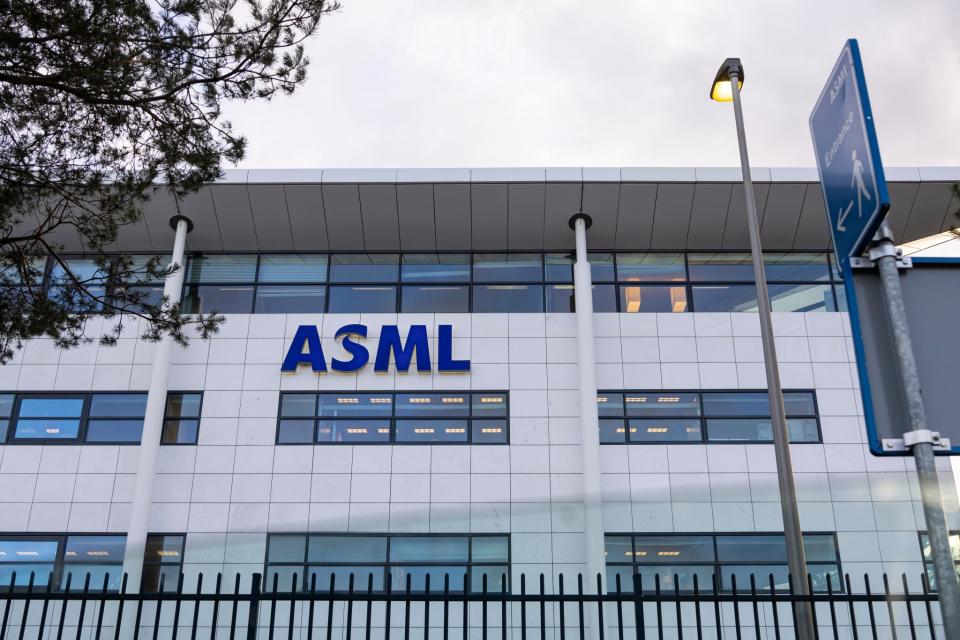Semiconductor giant ASML is one of Europe’s most ‘over-owned’ stocks, Morgan Stanley says—but it doesn’t necessarily signal the beginning of an AI bubble

ASML’s AI-driven growth has lifted its stock to record highs, aligning with trends seen in Microsoft, Nvidia, and Arm, but despite concerns of a bubble, current indications suggest otherwise.
Morgan Stanley research positions ASML as the second most “over-owned” European equity, following Novo Nordisk in the pharmaceutical sector.
Shares in the Dutch group have soared more than 20% since the start of the year, propelled by increased demand for chip technology on the back of fast-moving progress in AI and making it Europe’s most valuable European tech firm.
ASML manufactures hardware that manufacturers buy to produce their chips, giving the company a rising tide effect as orders pile up for other semiconductor producers.
Morgan Stanley research, which tracks 277 investment funds worth a combined $1.2 trillion, would suggest that demand has pushed the semiconductor giant into overvalued territory, reaching near the top of the list for stocks among global fund managers.
Over-owned stocks are usually regarded as a negative signal, indicating their share price is higher than their underlying market value, and would assume a market correction is likely.
An AI bubble?
Analysts have been warning of a bubble for some time as markets defy months of high inflation and rising interest rates, as the S&P 500 rose more than 24% last year.
The AI sector has become an increasingly important microcosm of this trend.
Nvidia’s stock more than tripled in value last year, while a 40% bump this year helped propel the AI chip pioneer above Amazon to become the fourth most valuable company in the U.S.
Shares in SoftBank-owned U.K. AI darling Arm jumped nearly 50% on the day it released third-quarter earnings that showed surprising levels of demand for its royalty-generating AI technologies.
Investors have piled their money into the most obvious benefactors of demand for AI, like tech companies and chip producers.
Other sectors may reap the benefits, too, with Goldman Sachs’ head of macro research in Europe, Peter Oppenheimer, comparing the buzz to the canal boom of the 18th century.
The hype divided analysts last year, though fears appear to have died down since.
In August, DeVere Group CEO Nigel Green warned buzz around AI was reaching “fever pitch” as Nvidia galloped away.
“This level of hype is dangerous as it could lead investors to assume that these stocks are a silver bullet to build long-term wealth,” he said. “And they are not, at least not on their own.”
The other trend that has pushed ASML into “over-owned” territory, however, is likely a result of a growing herd mentality among investors in recent years, who have been keen to pile into a stock market that keeps returning huge gains.
Fund managers tend to select a collection of high-value stocks in an indexed form, with the stake in each company declining as it falls in value.
That helped the U.S.’s “Magnificent Seven” stock group, including Microsoft, Apple, and Tesla, which carried several S&P 500–tracking funds to positive returns last year.
For ASML, past trends suggest it could continue to ride this bullish wave for some time.
Marina Zavolock, Morgan Stanley’s chief European equity strategist, said: “Over-owned stocks are outperforming both the index and under-owned stocks since the market lows of October, a typical occurrence in rising markets.
“Interestingly, European funds’ largest overweights have seen the best performance among the three fund groups from October lows, and this has broadly been a trend since 2017.”
ASML loses Samsung
Not everyone is joining the herd and piling into ASML stock, and the company is more likely to be concerned about its business fundamentals than fund managers’ behavior as a chip war ensues across the globe.
The group was delivered a blow this week as Samsung announced it was withdrawing its entire 0.4% stake in ASML, Bloomberg first reported, citing financial disclosures from the South Korean tech giant.
The group is also facing a challenge from camera and printer producer Canon, which is hoping to undercut ASML with $150 million chipmaking machines.
Shares in the Dutch semiconductor giant have dipped in value by more than 3% in the past week.
This story was originally featured on Fortune.com
